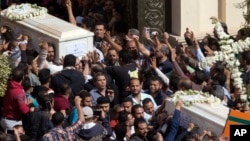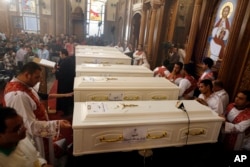Hundreds of mourners turned out for funeral services Saturday, after seven people were killed when their minibus was attacked by terrorists outside the Saint Samuel the Confessor Monastery in the southern Egyptian city of Minya a day earlier.
Families of the victims wailed and sobbed as the coffins of their loved ones were carried through the streets of Minya towards the Prince Tadros Church, where they were eulogized and mourned.
Inside the church, Coptic clerics spoke of forgiveness and hope, as families grieved for their departed loved ones, laid out in a row of white coffins near the front of the church.
The leader of Egypt's Coptic Christian Community, Pope Tawadros, told his followers that the attack was meant to sow division and that the best response was to avoid recrimination.
He said that it is clear to everyone that the aim of the attack was not just to kill Christians, but to undermine the unity and cohesion of Egyptian society as a whole.
Egyptian President Abdel Fattah el-Sisi expressed his condolences to Pope Tawadros in a phone call, and the Egyptian government agreed to pay benefits for those who were killed and wounded.
Survivors of the attack were transported to Cairo, where they are being treated in government facilities, without charge. A Coptic priest, Father Bishara Fahmy, told journalists that most of the dead were men.
He said that attackers pursued the minivan, shooting at its windows when they caught up with it, at which point they opened the doors and, according to survivors, shot the men in the head, while shooting the women in the legs.
The Islamic State terrorist group reportedly claimed responsibility for the attack, although some Egyptian analysts were skeptical of the claim, arguing that many of the terrorists infiltrating the country from neighboring Libya are supported by foreign governments.
Mounir Adib, a specialist in Islamic radicalism told al-Arabiya TV that Egyptian security forces "have made major strides in recent months in protecting churches and have succeeded in dismantling dozens of terrorist cells that were attacking churches, monasteries and Christian clerics."
Adib went on to stress that it is "difficult to protect many monasteries, though, since they are located in desert regions, like the Saint Samuel Monastery," where Friday's attack took place. Saint Samuel, he noted, "is located on a winding desert road leading 130 kilometers through the Western Desert and on to Libya.
Friday's attack and a similar attack on Coptic pilgrims to the same monastery in May of last year were carried out by terrorists who infiltrated the Minya region, coming from Libya, according to Egyptian security sources.
Ahmed al-Mismari, who is the spokesman for eastern Libya military commander General Khalifa Hafter, has accused both Qatar and Sudan of supporting terrorists that have infiltrated Egypt and operate in the desert. Both countries deny the charges.





